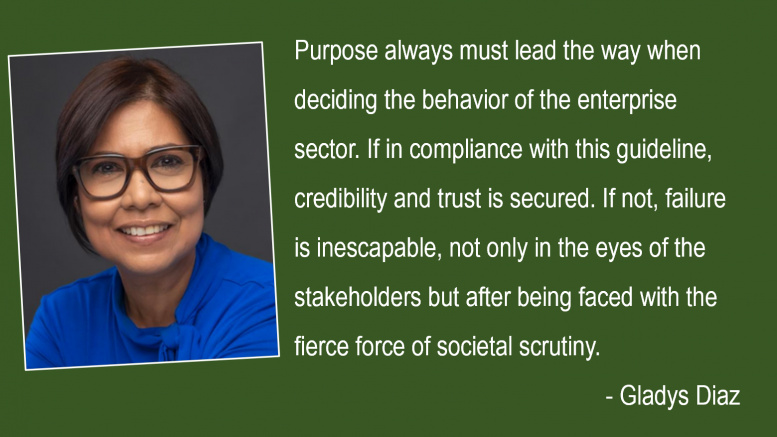Purpose is defined by Cambridge Dictionary as an intention or aim; a reason of doing something or for allowing something to happen. The same source defines influence as the power to have an effect on people or things, or someone or something having such power. Reviewing those concepts allows us to properly analyse the role of purposeful influence for the common good, a central principle for all public relations practitioners.
The subject matter makes perfect sense to me, since our discipline requires us to practice active listening, and pay attention to attitudes and input from stakeholders. That is quintessential to be able to develop actions supported by communication messages intended to generate understanding, social balance and mutually beneficial long-term relationships. I must emphasise first comes the actions followed by the communication, contrary to what many do nowadays. Why? Because actions speak louder than words. If we do not consider the key publics feedback to modify company plans and instead, we allow the C-Suite to transform ourselves into a tactical diffusion of information tool, we might be closer to facing conflicts or even potential crises that could have been avoided.
More than a century ago, in the first book ever written about public relations, Cristalising Public Opinion (1923), pioneer Edward Bernays stated powerful truths in relation to the value and the social significance of our profession. Perhaps a few references are in order:
- The public today demands information and expects also to be accepted as judge and jury in matters that have a wide public import. (page 65)
- Some public utilities maintain Public Relations departments, whose function it is to interpret the organisations to the public, as much as to interpret the public to them. (page 70)
- The public relations consultant (term coined by Bernays) is ideally a constructive force in the community. The results of his work are often accelerated interest in matters of value and importance to the social, economic or political life of the community. (page 82)
- It is in the creation of a public conscience that the counsel on public relations is destined, I believe, to fulfill his highest usefulness to the society in which he lives. (page 204)
It is impossible to mention in this article all the other great concepts Bernays explained with impressive clarity more than a hundred years ago, in relation to the comprehensive role of our profession and its importance in promoting the greater good.
As a result of the great access to information and the development of new technologies we have seen a shift from the Digital era. The Social and Corporate Activism era has been born. In reaction to controversial issues, government policies and even acts of war, enterprises are taking public stands to verbalise their anger or indignation, but mainly to promote justice, fairness and societal change. But genuine corporate activism requires taking a stand based on principles that are part of the company DNA. If not, the message will be bland, resulting in lack of credibility and trust, intangible assets that have grown significantly in relevance and importance at the global scene.
If your company believes in principles and values that have been exposed all over your facilities, behave like it is critical to operate; in other words, show it in everything the company does. Great examples of purposeful influence for the common good are evident in companies like Patagonia, the outdoor clothing company founded in 1973 by Yvon Chouinard. As the company grew, it developed an increased awareness of the environmental crisis assuming an activism approach. Also, their ESG values are evident, not only in the merchandise they sell, sometimes even calling out to not buy new items or inviting customers to resell their used clothing at the store, but in the decision to transform the company from privately owned into two newly created entities controlled by the Patagonia Purpose Trust. The reason behind this decision, taken in September 2022, was to create a permanent legal structure securing the company’s purpose and values. Also, Chouinard’s intention is to continue demonstrating that capitalism can work for the planet.
Purpose always must lead the way when deciding the behavior of the enterprise sector. If in compliance with this guideline, credibility and trust is secured. If not, failure is inescapable, not only in the eyes of the stakeholders but after being faced with the fierce force of societal scrutiny.
The views and opinions published here belong to the author and do not necessarily reflect the views and opinions of the publisher.



Be the first to comment on "Purposeful Influence for the Common Good: A guiding principle for a PR professional"